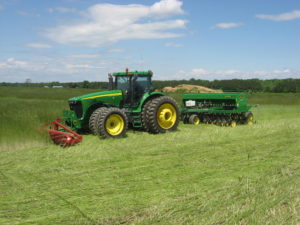Organic farmers and researchers utilize cover crops to reduce the labor and expense of organic mulches.
This article was featured in the Summer 2017 Quarterly.
by Brian Caldwell and Ryan Maher
Organic mulches like hay or straw can suppress weeds and improve soil. They are used by many small scale vegetable farmers, but the cost of the material and application may be prohibitive for larger operations. However, there may be ways around this obstacle. In recent years, organic grain farmers and the Rodale Institute successfully pioneered a practice of using rolled/crimped rye cover crops as mulchesgrown in-situ for soybeans. What can organic vegetable growers in the Northeast learn from this approach?
Following up on farmer efforts, researchers at Penn State and Cornell University codified the practice. It is often referred to as “Cover Crop-Based, Organic Rotational No-Till”. When winter rye is planted in mid-September in NY, it produces heavy biomass of 7500+ lb/acre, sufficient to suppress weeds when laid down in place as a mulch.

Fig. 1: Front-mounted roller/crimper.
In late spring, when the plants are tall and in flower, they are run over with a roller-crimper (Fig. 1), which knocks them down and kills them. Then, a heavy no-till planter is used to seed soybeans at a high density of about 250,000 seeds per acre, parallel to and in the same direction as the rolled rye. In fact, this can be done in one operation, with the roller/crimper on the front of the tractor and the planter behind. Usually, no weed cultivation is needed. Research plot soybean yields using this method are generally as good as or better than those of conventionally-tilled organic treatments.
For a fuller discussion, please see this article from the Cornell Sustainable Cropping Systems Lab.
Organic corn plantings have had less consistent success on both research and commercial farms. Whereas soybeans fix their own nitrogen, corn is a heavy nitrogen feeder. The soil often cannot supply enough N for both a heavy rye crop and subsequent corn plants. Attempts to remedy this by using hairy vetch mixtures as roll-crimped, N-supplying cover crops have given variable results, sometimes with poor weed suppression and low corn yields…..
Read the rest of the article here.

